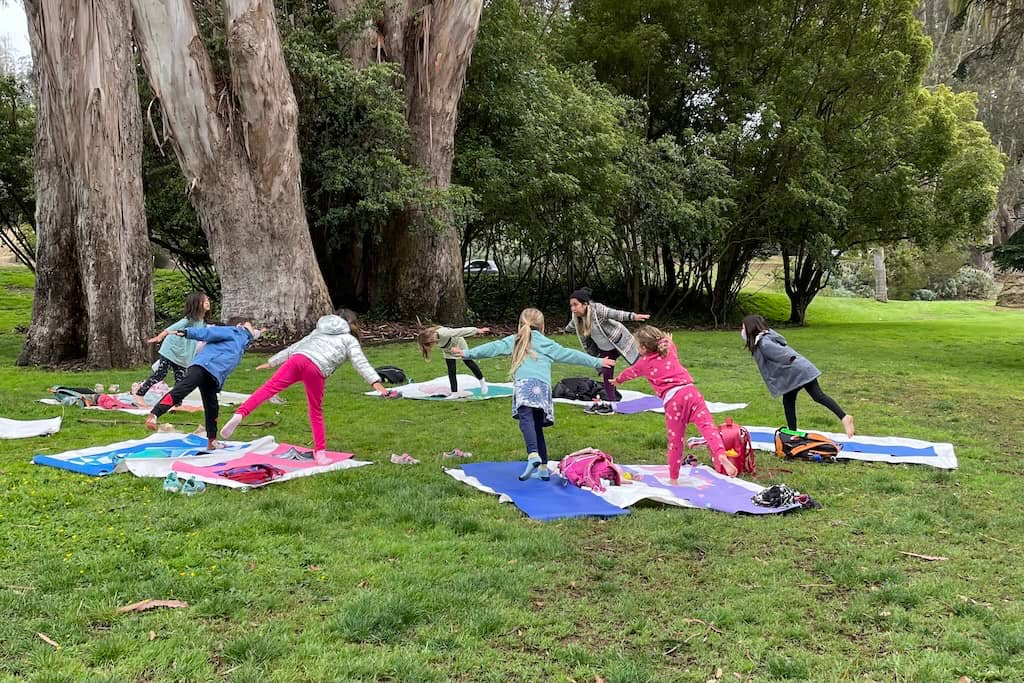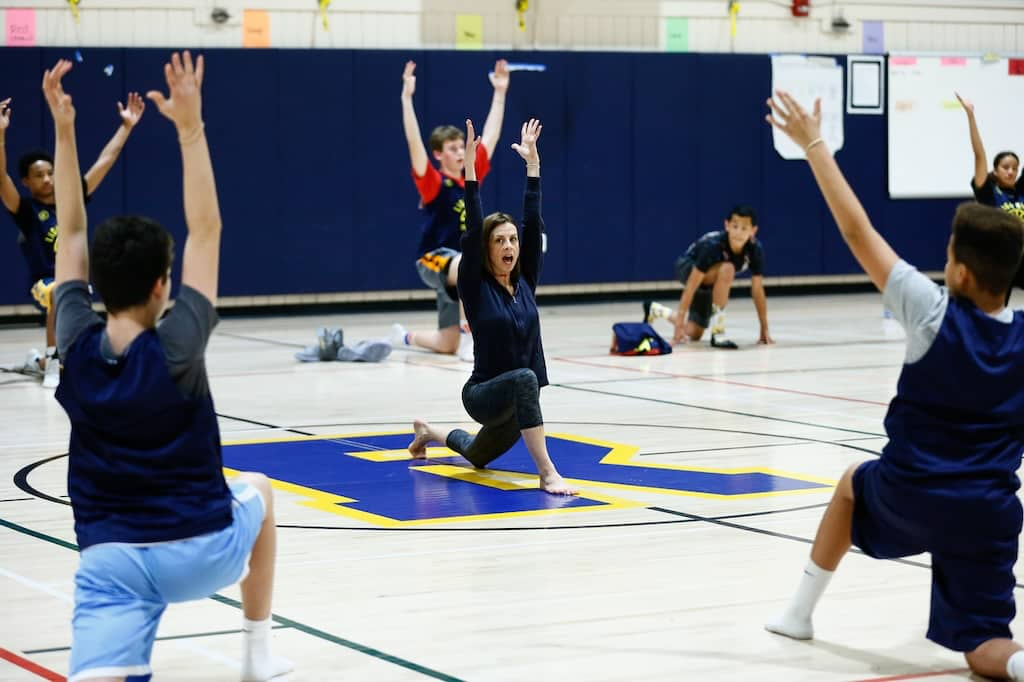
Press PLAY to listen to this post.
Running your own kids' yoga business can be a rewarding venture, combining your passion for yoga with the opportunity to shape young minds and bodies. Here’s a step-by-step guide on how to start and grow a successful kids' yoga business, especially if you want to "be your own boss” on National Bosses Day and beyond.
1. Get Certified
Before launching your kids’ yoga business, it's essential to have the proper training:
- Kids Yoga Certification: Enroll in specialized training programs that focus on teaching yoga to children. These programs cover the physical, mental, and emotional needs of kids’ growing bodies, minds and hearts.
- Research Your Audience: Find out what age groups you'll teach (toddlers, elementary-aged kids, teens) and tailor your services accordingly.
2. Choose Your Business Model
- Mobile Yoga Business: Teach in various locations such as schools, community centers, or private homes. This gives you flexibility without needing a dedicated studio space.
- Yoga Studio: Rent a space or work in partnership with existing studios. This can be more expensive but provides a consistent place for clients.
- Online Classes: Offer virtual classes, allowing you to expand your reach beyond your immediate area. You can create pre-recorded courses or hold live sessions via Zoom or other platforms.
3. Marketing Your Kids Yoga Business
- Define Your Mission: Clarify your goals, target audience, and why your business is unique. What do you want kids to gain from your classes—physical strength, mindfulness, fun, or a combination?
- Create a Website and Social Media Presence: Showcase your services, class schedule, and background. Instagram and Facebook are especially good for visual content and community engagement.
4. Manage Your Business Efficiently
- Scheduling and Payments: Use software to manage your bookings, payments, and communication with clients.
- Insurance and Legalities: Make sure to keep your insurance up-to-date and familiarize yourself with local regulations regarding working with children.
5. Balance and Sustainability
- Self-Care: Running your own business, especially one that involves teaching kids, can be demanding. Prioritize your own yoga and mindfulness practices to stay grounded.
- Work-Life Balance: Set clear boundaries between work and personal life, especially if you are offering private classes at homes or online.
With the right training, preparation, and passion, running a kids' yoga business can be an enriching experience that allows you to make a difference in children's lives while being your own boss.
Join the waitlist to become a qualified leader in your area. IYK® Warrior Training accredited by Yoga Alliance is offered once a year in February.

Press PLAY to listen to this post.
Indigenous Peoples' Day, celebrated on the second Monday in October, offers a meaningful opportunity to honor and acknowledge the history, culture, and contributions of Indigenous peoples. When considering how kids' yoga can be integrated into the recognition of Indigenous Peoples' Day, several connections can be made:
1. Connect with Nature
Yoga often emphasizes the connection between the body, mind, and the environment. Many Indigenous cultures have a profound relationship with nature, viewing the earth as a living entity. Incorporating nature-focused yoga poses (like tree pose, mountain pose, and animal-themed poses) can help kids reflect on the importance of nature and the environment, which is central to many Indigenous belief systems.
2. Mindfulness and Respect
One of the primary goals of kids' yoga is to instill mindfulness, respect for oneself, and respect for others. On Indigenous Peoples' Day, this mindfulness can be expanded to include respect for Indigenous cultures, traditions, and history. Coaches and educators can use yoga sessions to introduce topics like gratitude, respect for diversity, and learning from different cultures.
3. Land Acknowledgment and Gratitude Practice
Yoga encourages a practice of gratitude, and Indigenous Peoples' Day provides an opportunity to teach children about land acknowledgment—recognizing and respecting the Indigenous peoples who lived on the land before colonization. Coaches can integrate moments of gratitude into yoga practice by acknowledging the traditional lands they are practicing on, fostering awareness and appreciation in kids.
4. Celebrate Community and Unity
Indigenous Peoples' Day is also a time to celebrate the strength and resilience of Indigenous communities. Yoga can be practiced as a collective activity, emphasizing the idea of community, unity, and mutual support, which mirrors many Indigenous community values.
5. Cultural Sensitivity and Inclusivity
It's important for coaches and educators to approach any integration of Indigenous themes into yoga with cultural sensitivity. Partnering with local Indigenous educators or elders can help ensure that the teachings and practices are respectful and accurate, avoiding appropriation and instead focusing on true cultural appreciation.
By integrating kids' yoga with the themes of Indigenous Peoples' Day, coaches and educators can create a space for learning, reflection, and appreciation, helping children connect not only with their bodies but also with the cultural history and values of Indigenous communities.
Send the kids to IYK® Camp on Monday, October 14th, to learn yoga and about the land in the Presidio.

Press PLAY to listen to this post.
It’s National Coaches Day on October 6th. Research shows coaches have significant impact (positive or negative) on a child’s physical and mental health. There are approximately 45 million youth in sports (aged 5-18), that’s why we partner with Positive Coaching Alliance.
Youth coaches are increasingly getting kids' yoga certified for several reasons, as they recognize the physical, mental, and emotional benefits yoga provides to young athletes. Here's why this trend is growing:
1. Improved Focus and Concentration
Yoga teaches mindfulness and concentration, helping young athletes stay focused both in practice and during competition. Coaches see the value in improving athletes' mental clarity and concentration, which can enhance their performance in sports.
2. Injury Prevention
Yoga emphasizes flexibility, balance, and strength, which are essential for preventing injuries. Coaches are adopting yoga as part of their training routines to help kids build body awareness and develop a strong foundation that reduces the likelihood of common sports injuries like sprains and strains.
3. Stress Reduction and Emotional Regulation
The competitive nature of youth sports can sometimes lead to stress and anxiety. Yoga includes breathing techniques and relaxation practices that help kids manage stress, improve emotional regulation, and maintain a positive mindset. Coaches find this especially helpful in teaching kids to stay calm under pressure.
4. Improved Flexibility and Mobility
Yoga enhances flexibility, which is key for all sports. Coaches who incorporate yoga into their training programs help young athletes increase their range of motion, making them more agile and effective in their sport.
5. Building Resilience and Discipline
Yoga fosters mental resilience, teaching kids to persist through challenges and maintain discipline. This is important not just for their athletic development but also for their overall personal growth. Coaches find that the values instilled through yoga—such as patience, perseverance, and discipline—are essential life skills that benefit athletes on and off the field.
6. Inclusivity and Accessibility
Yoga is a non-competitive activity that promotes inclusivity, making it suitable for kids of all athletic abilities. Youth coaches appreciate that it can be integrated into training programs regardless of the sport and is accessible to everyone, allowing all team members to participate and benefit.
7. Holistic Development
Yoga aligns with the trend toward a more holistic approach to youth sports. Coaches are increasingly focused on developing the whole athlete—physically, mentally, and emotionally. Yoga supports this comprehensive development, providing tools to enhance both athletic performance and personal well-being.
Given these advantages, it's no surprise that more youth coaches are seeking yoga certifications to incorporate its benefits into their programs. Get the 5 keys to level up performance for youth athletes with our FREE Coaching Guide here.

Press PLAY to listen to this post.
The recent tragic death of Caden Tellier, a 16-year-old high school quarterback in Alabama, has reignited the conversation surrounding the safety of youth football. Caden’s fatal brain injury during a game is not an isolated incident; it is part of a concerning trend that has seen multiple high school football players lose their lives due to medical emergencies related to the sport. This has led experts to question whether football is truly safe—or even morally tenable—for young athletes.
The Growing Concerns Football remains America’s "favorite" sport, but its dangers, particularly for young players, cannot be ignored. One study found that 40% of contact sport athletes who died under the age of 30 had chronic traumatic encephalopathy (CTE), a brain disorder believed to be caused by repeated head injuries. Another study found that every 2.6 years of football participation doubles the chances of CTE, and more researchers are worried about kids starting such a dangerous sport at a young age.
Enacting change could take a real Hail Mary. As the debate rages on, there is an urgent need to explore safer ways to support youth athletes, both physically and mentally.
The Role of Yoga in Youth Athletics Yoga offers a unique and holistic approach to athletic training that could be a vital complement to traditional sports like football. For youth athletes, yoga provides numerous benefits that go beyond physical conditioning:
1. Injury Prevention: Yoga enhances flexibility, balance, and strength, which can help reduce the risk of injuries on the field. By improving overall body awareness, athletes are better equipped to avoid harmful movements that could lead to serious injuries.
2. Mental Resilience: The practice of mindfulness and meditation in yoga can help young athletes manage stress and anxiety, which are often exacerbated by the high-pressure environment of competitive sports. Developing a strong mental game is just as important as physical prowess.
3. Recovery and Healing: Yoga promotes recovery by reducing muscle tension and improving circulation. It can be particularly beneficial for athletes recovering from injuries, offering gentle stretches and poses that aid in the healing process.
4. Mind-Body Connection: One of the most profound benefits of yoga is the development of a strong mind-body connection. This awareness helps athletes tune into their bodies’ signals, recognizing when they are pushing too hard or when they need to rest, potentially preventing overuse injuries.
Incorporating Yoga into Athletic Programs Given the risks associated with contact sports like football, it’s time for coaches, parents, and athletes to consider incorporating yoga into training routines. Schools and sports programs should explore adding yoga sessions to their regular practice schedules, not only to enhance performance but also to prioritize the safety and well-being of young athletes.
Caden Tellier’s untimely death is a stark reminder of the dangers inherent in contact sports. As we mourn his loss and reflect on the safety of youth football, it’s crucial to explore alternative approaches that promote both physical and mental health. Yoga, with its emphasis on balance, mindfulness, and injury prevention, could be a key component in protecting our young athletes as they pursue their passion for sports.
The conversation around youth football safety is far from over, but as we navigate this complex issue, integrating practices like yoga could be a positive step toward ensuring the health and longevity of our athletes.
Coaches need training because every youth athlete can benefit from yoga in sports. We provide it. Get your team started for safer futures. It's free!
